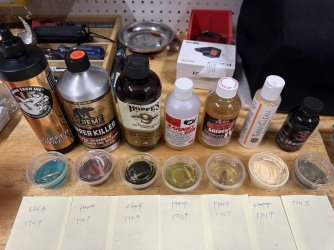-
If you are being asked to change your password, and unsure how to do it, follow these instructions. Click here
You are using an out of date browser. It may not display this or other websites correctly.
You should upgrade or use an alternative browser.
You should upgrade or use an alternative browser.
Part 4 Good Results. Which copper solvent cleaner do you think will work best?
- Thread starter Justice1327
- Start date
 Help Support Long Range Hunting Forum
Help Support Long Range Hunting Forum
quandary
Well-Known Member
wipe out/patch out
Justice1327
Well-Known Member
Got it on order, along with K12wipe out/patch out
Justice1327
Well-Known Member
Got the rest of the solvents. Will test these starting on Sunday and post the results for the current solvents being tested
Justice1327
Well-Known Member
Here are the results. I'm not for sure why there wasn't a more substantial reduction in the weight of the copper bullets. Open to suggestions or recommendations.
Last edited:
FireFlyFishing
Well-Known Member
Here are the results. I'm not for sure why there wasn't a more substantial reduction in the weight of the copper bullets. Open to suggestions or recommendations.
Intriguing.
I suggest you try FMJ bullets and/or Barnes TSX. I think Barnes typically has softer copper and you may see a more pronounced change?
Did you weight the cups with solvent the first go? It'd be interesting to see which solvent evaporates faster.
Perhaps you could do a smear test with the bullet. Use it like a crayon and see if the copper broke down at all. Maybe on butcher paper?
What did I learn from this test? You can increase the weight of your match bullets by storing them in solvent.
Throw Sweets in the mix and I expect you will have a different result.
Rick Richard
Well-Known Member
Exactly.Throw Sweets in the mix and I expect you will have a different result.
does the solvent lose its "zing" when exposed to air that long?
is the copper bullet in an anaerobic environment, submerged, and not getting the same reaction chemically?
I have zero clue if any of that would matter.
just a thought.?
is the copper bullet in an anaerobic environment, submerged, and not getting the same reaction chemically?
I have zero clue if any of that would matter.
just a thought.?
OFtrash
Well-Known Member
Im no chemist and I didn't stay at a Holiday inn either. But I would think it would have to have some oxygen for the chemicals to react.does the solvent lose its "zing" when exposed to air that long?
is the copper bullet in an anaerobic environment, submerged, and not getting the same reaction chemically?
I have zero clue if any of that would matter.
just a thought.?
When you test gold and silver for karat/purity you don't place the entire item in the solution you scuff the metal on a grind stone and test the particles left behind. Maybe that would be a better test? Thanks for your effort/test
Justice1327
Well-Known Member
I have been doing some reading, and it seems like you need oxygen or air for the copper solvent solution to work better. That's why some say use a nylon brush even though nylon isn't going to scrape the copper out it creates air bubbles and that helps the solution break down the copper.
Ethanol effect on cartridge brass.
*NOTE -28 DAYS.* Time & Temperature?
The test fluids selected for this investigation were Fuel C, CE10a, CE17a, and CE25a. Fuel C was
selected as the control since it is representative of premium gasoline and is a standard test fluid widely
used for studying material compatibility to gasoline. Google- E15 effect on cartridge brass.

*NOTE -28 DAYS.* Time & Temperature?
The test fluids selected for this investigation were Fuel C, CE10a, CE17a, and CE25a. Fuel C was
selected as the control since it is representative of premium gasoline and is a standard test fluid widely
used for studying material compatibility to gasoline. Google- E15 effect on cartridge brass.
